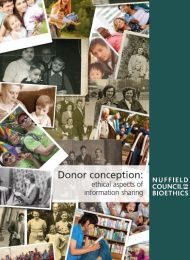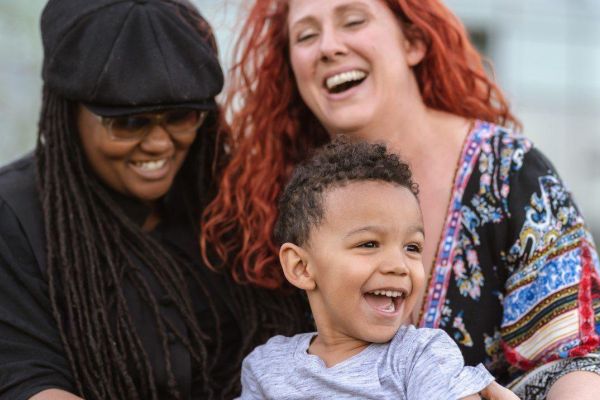Donor conception: ethical aspects of information sharing
Report
Published 17/04/2013

The Working Party took the approach that, wherever possible, measures that aim to support, encourage and empower those making decisions are preferable to measures that limit or remove choice.
On policy affecting prospective parents, we conclude
- It would be inappropriate to introduce any form of additional ‘screening’ of prospective parents in connection with their plans to tell, or not tell, their children that they are donor-conceived.
- It is not the role of the Government to intervene (for example through indications on the birth certificate) to ensure that all donor-conceived people know of the circumstances of their conception.
- As a matter of good professional practice, clinics should present counselling sessions as a routine part of the series of appointments that prospective parents attend before beginning treatment with donated gametes, in order to ensure the best possible support for those contemplating treatment.
- Information should be provided in a non-judgmental and understandable way that helps prospective parents to engage with the issues of disclosure and non-disclosure.
Clinics should routinely offer parents an additional support session later in pregnancy or after the birth of the child.
- The option of anonymous donation should not be reintroduced
On policy affecting parents and donor-conceived people during childhood and into adulthood, we conclude
- Information about donor conception, and about organisations that support donor-conceived people and their families, should be included in materials routinely available to pregnant women and new parents.
- While most support for donor-conceived families is provided by the voluntary sector, the state retains a responsibility to ensure that donor-conceived people and their families are able to access the support they need.
- The state should take an active role in ensuring that an appropriate counselling and intermediary service is in place for those who, in the future, may contact the HFEA for identifying information about their donor. The future of the voluntary register connecting pre-1991 donor-conceived people and donors should be secured on a long-term basis.
- Parents should be provided with clear and comprehensible information about the significant heritable conditions that have been ‘screened out’ in the donor assessment process, so that they may be reassured that the risk of their child inheriting such a condition is very low.
- A multi-disciplinary group should review and update current guidance on the screening and assessment of donors. It should also recommend what further medical information about the donor (if any) should be recorded on the donor information form for the future use of the donor-conceived person.
- A clear, well-publicised mechanism should be set up so that any significant medical information that emerges after donation may be shared between donors and donor-conceived people.
On policy affecting donor-conceived adults who do not have access to information, we conclude
- The rules about anonymity for donors who donated before 2005 should not be changed. However, the state should take action to increase awareness among past donors that a willingness on their part to become identifiable would be highly valued by some donor-conceived adults.
- The HFEA should issue guidance to clinics setting out what is expected of them with respect to making information from pre-1991 records (where such records exist) available to donor-conceived adults.
- The HFEA should ensure – for example through the creation of a dedicated donor conception website – that factual information about the implications of seeking treatment with donor gametes abroad, or through unregulated methods, is readily accessible to those contemplating these routes to parenthood.
On policy affecting donors, we conclude
- Clinics should ensure that sessions with a counsellor are scheduled as part of the routine series of appointments that donors attend before deciding whether or not to go ahead with donation. Where donors have partners, clinics should strongly encourage partners to attend these sessions.
- Donors have a responsibility to think seriously about how they provide information about themselves, and clinics have a responsibility to provide appropriate support in doing so where required. Filling in the donor information form should not be seen as a brief administrative task.
- The HFEA’s National Donation Strategy Group should consider further the question of how much, and what kind of, information would be likely to be helpful to the recipient parents and, in time, the donor-conceived person, so that this is routinely recorded on the donor information form. In doing so, it should draw on the expertise of a range of interested parties.

Share